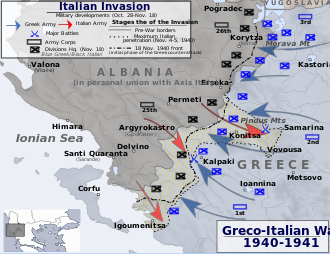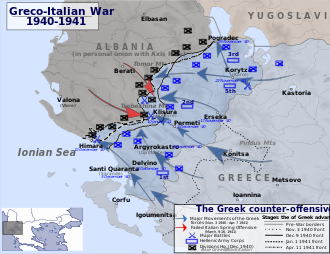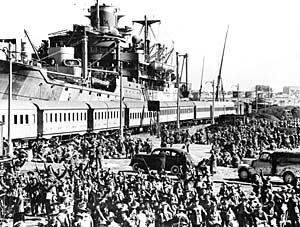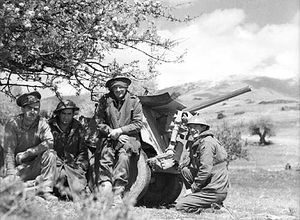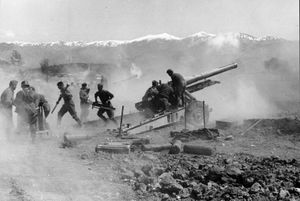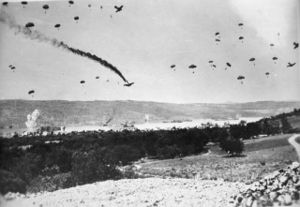معركة اليونان
| معركة اليونان | |||||||||
|---|---|---|---|---|---|---|---|---|---|
| جزء من حملة البلقان أثناء الحرب العالمية الثانية | |||||||||
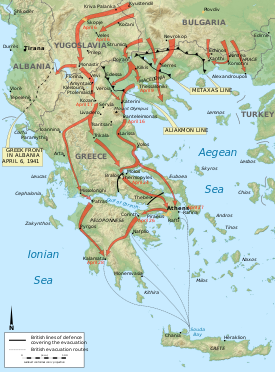 هجوم ألمانيا النازية على اليونان | |||||||||
| |||||||||
| المتحاربون | |||||||||
|
Axis: |
Allies: | ||||||||
| القادة والزعماء | |||||||||
|
|
| ||||||||
| القوى | |||||||||
|
Germany:[1][2] 680,000 men 1,200 tanks 700 aircraft 1Italy:[3] 565,000 men 463 aircraft[4] 163 tanks Total: 1,245,000 men |
1Greece:[5][6] 430,000 men, 20 tanks British Empire:[7][8][9][10][11] 262,612 men 100 tanks 200–300 aircraft | ||||||||
| الضحايا والخسائر | |||||||||
|
1Italy:[11] 13,755 dead, 63,142 wounded, 25,067 missing 3Germany:[12] 1,099 dead, 3,752 wounded, 385 missing |
1Greece:[11] 13,408 dead,[13] 42,485 wounded,[14] 1,290 missing British Empire:[7] 903 dead, 1,250 wounded, 13,958 captured | ||||||||
|
1Statistics about the strength and casualties of Italy and Greece refer to both the Greco-Italian War and the Battle of Greece (at least 300,000 Greek soldiers fought in Albania).[2] | |||||||||
معركة اليونان (وتُعرف أيضاً بإسم العملية ماريتا Marita، ألمانية: Unternehmen Marita؛ إنگليزية: Battle of Greece)[16] هي الاسم الشائع لغزو المحور لليونان المنضوية ضمن للحلفاء من قِبل ألمانيا النازية في أبريل 1941 أثناء الحرب العالمية الثانية. وقد تضافرت مع الغزو الإيطالي الفاشي الفاشل المعروف بإسم الحرب الإيطالية اليونانية. وعادة ما تُميـَّز عن معركة كريت، التي جاءت في أعقاب إخضاع بر اليونان الرئيسي. تلك العمليات للمحور كانت جزءاً من حملة البلقان الأكبر لألمانيا.
At the time of the German invasion, Greece was at war with Fascist Italy, following the Italian invasion on 28 October 1940. The Greeks joined the Allies and defeated the initial Italian attack and the counter-attack of March 1941. When Operation Marita began on 6 April, the bulk of the Greek Army was on the Greek border with Albania, then a protectorate of Italy, from which the Italian troops had attacked. German troops invaded from Bulgaria, creating a second front. Greece had already received a small, inadequate reinforcement from British Empire forces in anticipation of the German attack, but no more help was sent afterward. The Greek army found itself outnumbered in its effort to defend against both Italian and German troops. As a result, the Bulgarian defensive line did not receive adequate troop reinforcements and was quickly overrun by the Germans, who then outflanked the Greek forces at the Albanian border, forcing their surrender. The British Empire forces were overwhelmed and forced to retreat, with the ultimate goal of evacuation. For several days, Allied troops played an important part in containing the German advance on the Thermopylae position, allowing ships to be prepared to evacuate the units defending Greece.[17] The German Army reached the capital, Athens, on 27 Aprila[›] and Greece's southern shore on 30 April, capturing 7,000 British Empire forces and ending the battle with a decisive victory. The conquest of Greece was completed with the capture of Crete a month later. Following its fall, Greece was occupied by the military forces of Germany, Italy and Bulgaria.[18]
ولاحقاً أنحى هتلر باللوم لفشل غزوه الاتحاد السوڤيتي، الذي توجـَّب تأجيله، على فشل موسوليني فتح اليونان.[19] هذا التفسير لهزيمة ألمانيا الكارثية أمام الاتحاد السوڤيتي دحضه معظم المؤرخون، الذين اتهموا هتلر بمحاولة ازاحة اللوم (لهزيمة بلاده) عن نفسه وإلصاقه بحليفته، إيطاليا.[20] إلا أن معركة اليونان كان لها عواقب وخيمة لمجهودات المحور الحربية في مسرح عمليات شمال أفريقيا. إنو فون رينتلن، الذي كان ملحقاً عسكرياً في روما، أكـَّد من وجهة النظر الألمانية، على الخطأ الاستراتيجي المتمثل في عدم الاستيلاء على مالطا.[21]
خلفية
الحرب الإيطالية اليونانية
Hitler always faces me with a fait accompli. This time I am going to pay him back in his own coin. He will find out from the papers that I have occupied Greece.
| Italian invasion and initial Greek counter-offensive 28 October – 18 November 1940. |
Greek counter-offensive and stalemate 14 November 1940 – 23 April 1941. |
قرار هتلر للهجوم على اليونان والغوث البريطاني
Letter Adolf Hitler addressed to Mussolini on 20 November 1940[24]
قوة التجريدة البريطانية
Winston Churchill[25]
الافتتاحية
الطبوغرافيا
الاستراتيجية

قوات الدفاع والهجوم
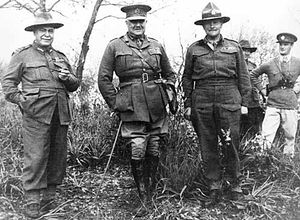
الغزو الألماني
الاندفاع عبر جنوب يوغسلاڤيا والتقدم نحو سالونيك
الهجوم المضاد اليوناني-اليوغسلاڤي
خط متاكساس
مضائق أولمپوس وسرڤيا
انسحاب واستسلام جيش إپيروس اليوناني
موقع ثرموپيلاي
الاندفاع الألماني نحو أثينا
Wilhelm Keitel[27]
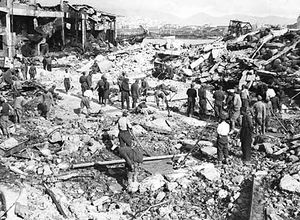
You are listening to the voice of Greece. Greeks, stand firm, proud and dignified. You must prove yourselves worthy of your history. The valor and victory of our army has already been recognised. The righteousness of our cause will also be recognised. We did our duty honestly. Friends! Have Greece in your hearts, live inspired with the fire of her latest triumph and the glory of our army. Greece will live again and will be great, because she fought honestly for a just cause and for freedom. Brothers! Have courage and patience. Be stout hearted. We will overcome these hardships. Greeks! With Greece in your minds you must be proud and dignified. We have been an honest nation and brave soldiers.[29]
إخلاء قوات الامبراطورية
Robert Menzies, Excerpts from his personal diary, 27 and 28 April 1941[30]

الأعقاب
الاحتلال الثلاثي
معركة كريت
التقييم
قالب:Battle of Greece timeline infobox
الهامش
- ^ Collier 1971, p. 180.
- ^ أ ب Helios 1945, Greek Wars.
- ^ Richter 1998, pp. 119, 144.
- ^ History, Hellenic Air Force, http://www.haf.gr/en/history/history/history_6.asp, retrieved on 25 March 2008.
- ^ "Campaign in Greece". The Encyclopedia Americana.
- ^ Ziemke.
- ^ أ ب ت Beevor 1994, p. 26.
- ^ Long 1953, pp. 182–83.
- ^ "7" (PDF), History, AU: AWM, http://www.awm.gov.au/cms_images/histories/18/chapters/07.pdf.
- ^ McClymont 1959, p. 486.
- ^ أ ب ت ث Richter 1998, pp. 595–97.
- ^ أ ب Bathe & Glodschey 1942, p. 246.
- ^ Zabecki, David (2014), Germany at War: 400 Years of Military History (4 volumes), ABC-CLIO, p. 563, ISBN 978-1-598849806, "The Greek Army sustained 13,408 killed, 42,485 wounded, and 270,000 prisoners."
- ^ Zabecki, David (2014), Germany at War: 400 Years of Military History (4 volumes), ABC-CLIO, p. 563, ISBN 978-1-598849806, "The Greek Army sustained 13,408 killed, 42, 485 wounded, and 270,000 prisoners."
- ^ Hitler, Adolf, Speech to the Reichstag on 4 May 1941.
- ^ Smith 1986.
- ^ Johnston, Mark; Chagas, Carlos (2013), The Australian Army in World War II, Osprey Publishing, p. 18, ISBN 978-1846031236, "For several days Australian troops played a prominent part in a holding action on the Thermopylae Line in southern Greece, allowing ships to be assembled to evacuate thousands to Egypt and Crete on 24–27 April 1941."
- ^ Dear & Foot 1995, pp. 102–6.
- ^ Kershaw 2007, p. 178.
- ^ Hillgruber 1993, p. 506.
- ^ von Rintelen 1951, pp. 90, 92–3, 98–9.
- ^ Ciano 1946, p. 247.
- ^ Svolopoulos 1997, p. 272.
- ^ Blau 1986, p. 5.
- ^ Churchill 1991, p. 420.
- ^ Lawlor 1994, pp. 191–92.
- ^ Keitel 1979, p. 166.
- ^ Sampatakakis 2008, p. 28.
- ^ Fafalios & Hadjipateras 1995, pp. 248–49.
- ^ Menzies 1941.
- ^ Long 1953, pp. 104–5.
المراجع
- الكتب
- Bailey, Robert H. (1979). Partisans and Guerrillas (World War II). Alexandria, Va: Time-Life Books. ISBN 0-8094-2490-8.
{{cite book}}: Invalid|ref=harv(help) - Bathe, Rolf; Glodschey, Erich (1942). Der Kampf um den Balkan (in German). Oldenburg, Berlin: Stalling. OCLC 1251437.
{{cite book}}: Invalid|ref=harv(help); Unknown parameter|trans_title=ignored (|trans-title=suggested) (help)CS1 maint: unrecognized language (link) - Beevor, Antony (1994). Crete: The Battle and the Resistance (reissue ed.). Westview Press. ISBN 0-8133-2080-1.
{{cite book}}: Invalid|ref=harv(help) - Blau, George E. (1986) [1953]. The German Campaigns in the Balkans (Spring 1941) (reissue ed.). Washington, DC: United States Army Center of Military History. OCLC 16940402. CMH Pub 104-4.
{{cite book}}: Invalid|ref=harv(help) - Bradley, John N.; Buell, Thomas B. (2002). "Why Was Barbarossa Delayed?". The Second World War: Europe and the Mediterranean. The West Point Military History. Square One Publishers. ISBN 0-7570-0160-2.
{{cite book}}: Invalid|ref=harv(help) - Broad, Charlie Lewis (1958). Winston Churchill: A Biography. New York: Hawthorn Books. OCLC 254082.
{{cite book}}: Invalid|ref=harv(help) - Buckley, Christopher (1984). Greece and Crete 1941. Athens: P. Efstathiadis & Sons. OCLC 32376449.
{{cite book}}: Invalid|ref=harv(help) - Carlton, Eric (1992). "Selective Control: Nazi non-Eastern Occupation Policies". Occupation: The Policies and Practices of Military Conquerors. Routledge. ISBN 0-415-05846-5.
{{cite book}}: Invalid|ref=harv(help) - Churchill, Winston (1991) [1949]. "Yugoslavia and Greece". Memoirs of the Second World War. Boston: Houghton Mifflin. ISBN 0-395-59968-7.
{{cite book}}: Invalid|ref=harv(help) - Ciano, Galeazzo (1946). The Ciano Diaries, 1939–1943: The Complete, Unabridged Diaries of Count Galeazzo Ciano, Italian Minister for Foreign Affairs, 1936–1943. Doubleday. OCLC 245645.
{{cite book}}: Invalid|ref=harv(help) - Clark, Chris (2010). The Encyclopaedia of Australia's Battles (3rd ed.). Crows Nest, New South Wales: Allen and Unwin. ISBN 9781742373355.
{{cite book}}: Invalid|ref=harv(help) - Collier, Richard (1971). Duce!. Mazal Holocaust Collection. New York: Viking Adult. ISBN 0-670-28603-6.
{{cite book}}: Invalid|ref=harv(help) - Dear, I. C. B.; Foot, M. R. D. (1995). The Oxford Companion to the Second World War. New York: Oxford University Press. ISBN 978-0-19-866225-9.
{{cite book}}: Invalid|ref=harv(help) - Detwiler, Donald S.; Burdick, Charles; Rohwer, Jurgen (1979). World War II German Military Studies: The Mediterranean Theater. Vol. VI. New York: Garland. ISBN 9780824043124.
{{cite book}}: Invalid|ref=harv(help) - Fafalios, Maria; Hadjipateras, Costas (1995). Greece 1940–41: Eyewitnessed (in Greek). Athens: Efstathiadis. ISBN 960-226-533-7.
{{cite book}}: Invalid|ref=harv(help)CS1 maint: unrecognized language (link) - Goldstein, Erik (1992). "Second World War 1939–1945". Wars and Peace Treaties. London: Routledge. ISBN 0-415-07822-9.
{{cite book}}: Invalid|ref=harv(help) - Hillgruber, Andreas (1993). Hitlers Strategie. Politik und Kriegführung 1940–1941 (in German) (3rd ed.). Bonn. ISBN 3-76375-923-9.
{{cite book}}: Invalid|ref=harv(help); Unknown parameter|trans_title=ignored (|trans-title=suggested) (help)CS1 maint: location missing publisher (link) CS1 maint: unrecognized language (link) - Hondros, John (1983). Occupation and Resistance: The Greek Agony 1941–44. New York: Pella Pub. ISBN 0-918618-19-3.
{{cite book}}: Invalid|ref=harv(help) - Keegan, John (2005). The Second World War. Non-Classics (reprint ed.). New York: Penguin Books. ISBN 0-14-303573-8.
{{cite book}}: Invalid|ref=harv(help) - Keitel, Wilhelm (1979). "Prelude to the Attack on Russia, 1940–1941". In Görlitz, Walter (ed.). In the Service of the Reich. transl David Irving. New York: Stein & Day.
{{cite book}}: Invalid|ref=harv(help) - Kershaw, Ian (2007). Fateful Choices: Ten Decisions that Changed the World, 1940–1941. London: Allen Lane. ISBN 978-0-7139-9712-5.
{{cite book}}: Invalid|ref=harv(help) - Kirchubel, Robert (2005). "Opposing Plans". Operation Barbarossa 1941: Army Group North. Vol. II. Oxford: Osprey. ISBN 1-84176-857-X.
{{cite book}}: Invalid|ref=harv(help) - Lawlor, Sheila (1994). Churchill and the Politics of War, 1940–1941. Cambridge, New York: Cambridge University Press. ISBN 0-521-46685-7.
{{cite book}}: Invalid|ref=harv(help) - Lee, Stephen J. (2000). Dictatorship in Italy. European Dictatorships, 1918–1945. London: Routledge. ISBN 0-415-23045-4.
{{cite book}}: Invalid|ref=harv(help) - Long, Gavin (1953). Greece, Crete and Syria. Australia in the War of 1939–1945. Vol. II. Canberra, ACT: Australian War Memorial. OCLC 3134080.
{{cite book}}: Invalid|ref=harv(help) - Macdougall, A. K. (2004). Australians at War: A Pictorial History. Noble Park: The Five Mile Press. ISBN 1-86503-865-2.
{{cite book}}: Invalid|ref=harv(help) - McClymont, W. G. (1959). "6–22". To Greece. The Official History of New Zealand in the Second World War 1939–1945. Wellington, NZ: War History Branch, Department of internal affairs. OCLC 4373298. Retrieved 8 April 2014.
{{cite book}}: Invalid|ref=harv(help) - Murray, Williamson; Millett, Allan Reed (2000). "Diversions in the Mediterranean and Balkans". A War to Be Won: Fighting the Second World War. Cambridge: Harvard University Press. ISBN 0-674-00680-1.
{{cite book}}: Invalid|ref=harv(help) - Neville, Peter (2003). Mussolini. The Slide to Disaster. London: Routledge. ISBN 0-415-24989-9.
{{cite book}}: Invalid|ref=harv(help) - Papagos, Alexandros (1949). The Battle of Greece 1940–1941 (in Greek). Athens: J.M. Scazikis Alpha. OCLC 3718371.
{{cite book}}: Invalid|ref=harv(help)CS1 maint: unrecognized language (link) - Playfair, I. S. O; Flynn, F. C.; Moloney, C. J. C.; Toomer, S. E. (2004) [1956]. Butler, J. R. M. (ed.). The Mediterranean and Middle East: The Germans Come to the Help of Their Ally (1941). History of the Second World War: United Kingdom Military Series. Vol. II (Naval & Military Press ed.). London: HMSO. ISBN 1-845740-66-1.
{{cite book}}: Unknown parameter|lastauthoramp=ignored (|name-list-style=suggested) (help) - von Rintelen, Enno (1951). Mussolini als Bundesgenosse. Erinnerungen des deutschen Militärattachés in Rom 1936–1943 (in German). Tübingen/Stuttgart: R. Wunderlich. OCLC 4025485.
{{cite book}}: Invalid|ref=harv(help); Unknown parameter|trans_title=ignored (|trans-title=suggested) (help)CS1 maint: unrecognized language (link) - Richter, Heinz A. (1998). Greece in World War II (in Greek). transl by Kostas Sarropoulos. Athens: Govostis. ISBN 960-270-789-5.
{{cite book}}: Invalid|ref=harv(help)CS1 maint: unrecognized language (link) - Riefenstahl, Leni (1987). Leni Riefenstahl: A Memoir. New York: Picador. ISBN 0-312-11926-7.
{{cite book}}: Invalid|ref=harv(help) - Rodogno, Davide (2006). Fascism's European Empire: Italian Occupation During the Second World War. Italo-German Relations in Mediterranean Europe. transl by Adrian Belton. London: Cambridge University Press. ISBN 0-521-84515-7.
{{cite book}}: Invalid|ref=harv(help) - Sampatakakis, Theodoros (2008). "From the Invasion to the Capitulation". Katohi kai Antistasi 1941–1945 (in Greek). Athens: Ch. K. Tegopoulos.
{{cite book}}: Invalid|ref=harv(help); Unknown parameter|trans_title=ignored (|trans-title=suggested) (help)CS1 maint: unrecognized language (link) - Sharpe, Michael; Westwell, Ian (2008). German Elite Forces: 5th Gebrigsjager Division and Brandenburgers. London: Compendium. ISBN 9781905573899.
{{cite book}}: Invalid|ref=harv(help) - Shores, Christopher F.; Cull, Brian; Malizia, Nicola (1987). Air War for Yugoslavia, Greece, and Crete, 1940–41. London: Grub Street. ISBN 978-0-948817-07-6.
{{cite book}}: Invalid|ref=harv(help) - Simpson, Michael (2004). A Life of Admiral of the Fleet Andrew Cunningham: A Twentieth-Century Naval Leader. London: Cass. ISBN 0-7146-5197-4.
{{cite book}}: Invalid|ref=harv(help) - Smith, A. C. (1986) [1953]. "The German Campaign in Greece (Operation Marita)". The German campaigns in the Balkans (Spring 1941). Part III. Washington, DC: Army Center of Military History. pp. 70–118. OCLC 464601908. DA Pam 20–260. Retrieved 2013-04-01.
{{cite book}}: Invalid|ref=harv(help) - Stahel, David (2012). Kiev 1941: Hitler's Battle for Supremacy in the East. Cambridge: Cambridge University Press. ISBN 978-1-107-01459-6.
{{cite book}}: Invalid|ref=harv(help) - Svolopoulos, Konstantinos (1997). The Greek Foreign Policy (in Greek). Athens: Estia. ISBN 960-05-0432-6.
{{cite book}}: Invalid|ref=harv(help)CS1 maint: unrecognized language (link) - Thomas, David A. (1972). Nazi Victory: Crete 1941. New York: Stein & Day. ISBN 978-0-8128-1559-7.
{{cite book}}: Invalid|ref=harv(help) - Titterton, G. A. (2002). "British Evacuate Greece". The Royal Navy and the Mediterranean. London: Routledge. ISBN 0-7146-5205-9.
{{cite book}}: Invalid|ref=harv(help) - Vick, Alan (1995). "The German Airborne Assault on Greece". Snakes in the Eagle's Nest: A History of Ground Attacks on Air Bases. Santa Monica: Rand. ISBN 0-8330-1629-6.
{{cite book}}: Invalid|ref=harv(help)
- الموسوعات
- Eggenberger, David (1985). "Greece (World War II)". An Encyclopedia of Battles. New York: Courier Dover Publications. ISBN 0-486-24913-1.
{{cite encyclopedia}}: Invalid|ref=harv(help) - Helios encyclopedia. 1945–1955.
{{cite encyclopedia}}: Missing or empty|title=(help)
- الدوريات
- Creveld, Martin van (July–October 1972). "In the Shadow of Barbarossa: Germany and Albania, January – March 1941". Journal of Contemporary History. 7 (3/4): 22–230. doi:10.1177/002200947200700313. ISSN 0022-0094. JSTOR 259913.
{{cite journal}}: Invalid|ref=harv(help) - Lawlor, Sheila (December 1982). "Greece, March 1941: The Politics of British Military Intervention". The Historical Journal. London: Cambridge University Press. XXV (4): 933–946. doi:10.1017/s0018246x00021294. ISSN 0018-246X.
{{cite journal}}: Invalid|ref=harv(help) - Sadkovich, James J. (July 1993). "The Italo-Greek War in Context: Italian Priorities and Axis Diplomacy". Journal of Contemporary History. Sage. XXVIII (3): 439–464. doi:10.1177/002200949302800303. ISSN 0022-0094.
{{cite journal}}: Invalid|ref=harv(help)
- الصحف
- "Report on Evacuation of British Troops from Greece, April, 1941". Supplement to The London Gazette. No. 38293. 19 May 1948. pp. 3052–3053. OCLC 813744927. Retrieved 7 January 2014.
- الفيديوهات
- The Roof is Leaking. Australia's Wars 1939–1945. Australian Department of Veterans' Affairs. Retrieved 2006-10-09.
- المواقع
- "Balkan Operations – W-Force – 5 April 1941". Orders of Battle. Retrieved 2007-03-31.
- Barrass, M. B. (2013). "Air Marshal Sir John D'Albiac". Air of Authority: A History of RAF Organisation. Retrieved 2007-03-31.
{{cite web}}: Invalid|ref=harv(help) - Duncan, George. "More Maritime Disasters of World War II". Historical Facts of World War II. Archived from the original on 1 September 2007. Retrieved 2007-09-14.
{{cite web}}: Invalid|ref=harv(help); Unknown parameter|deadurl=ignored (|url-status=suggested) (help) - "Events Marking the Anniversary of the Liberation of the City of Athens from Occupation Troops". News in English. The Hellenic Radio (ERA). 2000-10-12. Retrieved 2007-04-23.
- Menzies, Robert (1941). "The Greek campaign". Diary. Old Parliament House, Canberra. Archived from the original on 9 September 2006. Retrieved 2006-09-12.
{{cite web}}: Invalid|ref=harv(help) - "More U-boat Aces Hunted down". Chronology of World War II. On War. 16 March 1941. Retrieved 2006-10-06.
- Ziemke, Earl F. "Balkan Campaigns". World War II Commemoration. Grolier. Archived from the original on 5 February 2007. Retrieved 2007-04-04.
{{cite web}}: Invalid|ref=harv(help)
للاستزادة
- الكتب
- Barber, Laurie; Tonkin-Covell, John (1990). Freyberg: Churchill's Salamander. Hutchinson. ISBN 1-86941-052-1.
- Bitzes, John (1989). Greece in World War II: To April 1941. Sunflower University Press. ISBN 0-89745-093-0.
- Bosworth, R. J. B. (2002). Mussolini. London: Hodder Arnold. ISBN 0-340-73144-3.
- Churchill, Winston (1974). Rhodes James, Robert (ed.). His Complete Speeches, 1897–1963. Chelsea House Publisher. ISBN 0-8352-0693-9.
- Ėrlikhman, Vadim (1946). The Ciano Diaries: the Complete, Unabridged Diaries of Count Galeazzo Ciano, Italian Minister for Foreign Affairs, 1936–1943. Doubleday. OCLC 245645.
- Goebbels, Joseph (1982). Diaries, 1939–41. transl Fred Taylor. Hamish Hamilton. ISBN 0-241-10893-4.
- Hitler, Adolf (1981). Hitlers politisches Testament. Die Bormann Diktate vom Februar und April 1945 (in German). Hamburg: Albrecht Knaus. ISBN 3-81355-111-3.
{{cite book}}: Unknown parameter|trans_title=ignored (|trans-title=suggested) (help)CS1 maint: unrecognized language (link) - Kitsikis, Dimitri (1971). "Information et décision: la Grèce face à l'invasion allemande dans les Balkans, 13 décembre 1940 – 6 avril 1941". La guerre en Méditerranée, 1939–1945 (in French). Paris: Centre national de la Recherche scientifique. pp. 181–209. OCLC 660825581.
{{cite book}}: Unknown parameter|trans_title=ignored (|trans-title=suggested) (help)CS1 maint: unrecognized language (link) - Panayiotis, Jerasimof Vatikiotis (1998). "Metaxas Becomes Prime Minister". Popular Autocracy in Greece, 1936–41: a Political Biography of General Ioannis Metaxas. Routledge. ISBN 0-7146-4869-8.
- Pelt, Mogens (1998). Tobacco, Arms and Politics: Greece and Germany from World Crisis to World War, 1929–1941. Copenhagen: Museum Tusculanum Press. ISBN 87-7289-450-4.
- Powell, Dilys (1941). Remember Greece. London: Hodder & Stoughton. OCLC 4550659.
- Wards, Ian McLean (1952). "Panzer Attack in Greece". In Kippenberger, H. K. (ed.). Episodes & Studies. New Zealand in the Second World War. Vol. II. Wellington, NZ: War History Branch, Department of Internal Affairs. OCLC 173284173.
- الموسوعات
- "Campaign in Greece". The Encyclopedia Americana. Danbury: Grolier. 2000. ISBN 0-7172-0133-3.
- الدوريات
- Creveld, Martin van (July 1974). "Prelude to Disaster: The British Decision to Aid Greece, 1940–41". Journal of Contemporary History. Sage. IX (3): 65–92. doi:10.1177/002200947400900303. ISSN 0022-0094. Retrieved 26 May 2015.
- Kitsikis, Dimitri (July–September 1967). "La Grèce entre l'Angleterre et l'Allemagne, de 1936 à 1941". Revue historique (in French). Paris. 238 (91e année).
{{cite journal}}: Unknown parameter|trans_title=ignored (|trans-title=suggested) (help)CS1 maint: unrecognized language (link) - Sadkovich, James J. (October 1994). "Anglo-American bias and the Italo-Greek War of 1940–1941". The Journal of Military History. 58 (4): 617–642. doi:10.2307/2944271.
- Sadkovich, James J. (May 1994). "Italian Morale during the Italo-Greek War of 1940–1941". War and Society. 12 (1): 97–123. doi:10.1179/072924794794954323.
- الصحف
- Nicholson, Jim (2006-11-24). "Celebration of Greek Armed Forces in Washington – Remarks by Secretary for Veteran Affairs". Press Office of the Embassy of Greece. Retrieved 2007-05-24.
- المواقع
- Pilavios, Konstantinos (director); Tomai, Fotini (text & presentation) (2010-10-28). "The Heroes Fight like Greeks—Greece during the Second World War" (Motion Picture) (in Greek). Athens: Service of Diplomatic and Historical Archives of the Greek Ministry of Foreign Affairs. Archived from the original on 31 October 2010. Retrieved 2010-10-28.
{{cite web}}: Unknown parameter|deadurl=ignored (|url-status=suggested) (help)CS1 maint: unrecognized language (link) - Roosevelt, Franklin D. (5 December 1940). "President Roosevelt to King George of Greece". Peace and War: United States Foreign Policy, 1931–1941. Archived from the original on 14 August 2007. Retrieved 2007-08-01.
{{cite web}}: Unknown parameter|deadurl=ignored (|url-status=suggested) (help) - "A Great Risk in a Good Cause, Australians in Greece and Crete April – May 1941". Department of Veterans' Affairs. May 2001. Archived from the original on 20 May 2009. Retrieved 2009-05-05.
{{cite web}}: Unknown parameter|deadurl=ignored (|url-status=suggested) (help) - "Judgement: The Aggression Against Yugoslavia and Greece". The Avalon Project. Yale Law School. Archived from the original on 13 October 2007. Retrieved 2007-09-12.
{{cite web}}: Unknown parameter|deadurl=ignored (|url-status=suggested) (help) - "To Greece". Australian War Memorial. Archived from the original on 6 June 2007. Retrieved 2007-07-04.
{{cite web}}: Unknown parameter|deadurl=ignored (|url-status=suggested) (help)
وصلات خارجية
- Articles containing ألمانية-language text
- Pages using Lang-xx templates
- Articles containing إنگليزية-language text
- Articles with hatnote templates targeting a nonexistent page
- CS1 errors: unsupported parameter
- CS1 maint: location missing publisher
- CS1 errors: missing title
- مقالات مميزة
- 1941 في اليونان
- معركة اليونان
- نزاعات 1941
- Battles and operations of World War II involving Greece
- Battles of World War II involving Australia
- معارك الحرب العالمية الثانية التي شاركت فيها ألمانيا
- معارك الحرب العالمية الثانية التي شاركت فيها إيطاليا
- معارك الحرب العالمية الثانية التي شاركت فيها المملكة المتحدة
- Mediterranean Sea operations of World War II
- Invasions of Greece
- Invasions by Germany
- Invasions by Italy
- Invasions by Albania
